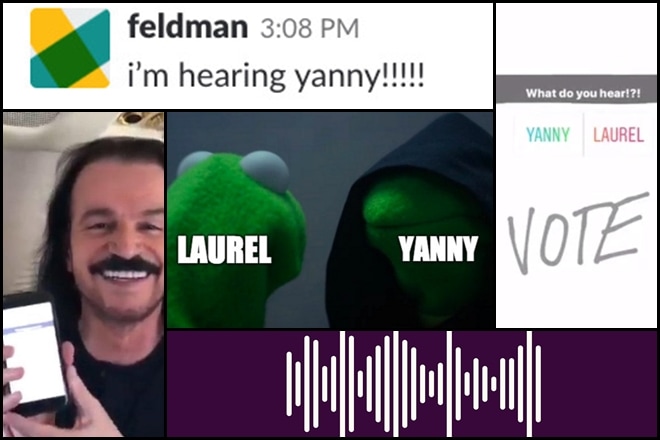Recently, a Twitter user and a YouTube vlogger, Cloe Feldman put up a tweet which went viral. The tweet had a 4-second audio clipping, however, the content of the clipping has divided the internet. As per the audio, some would listen to the audio as ‘Yanny’ while some of the people head the world ‘Laurel’. However, it is not just the tweet where it was mentioned first. On Monday, a Reddit user who goes by the name RolandCamry posted the clip online. This new audio clipping has become an internet sensation which has divided the people.
This is not the first time when the internet has been divided on a particular topic. Back in 2014, people were divided on “the dress” where some could see the dress as blue-black, while many saw it the image as white-gold. But how does the pronunciation of a particular word have two different sounds?
As reported by The Guardian, University of Sydney’s school of psychology Professor David Alais calls the audio ‘illusion’ an example of a “perceptually ambiguous stimulus”. However, The Verge talked to Lars Riecke who is the assistant professor of audition and cognitive neuroscience at Maastricht University. He said, “If you remove all the low frequencies, you hear yanny. If you remove the high frequencies, you hear laurel.” Riecke further adds that: “If your… ears emphasise both the higher and lower frequencies, you can toggle between the two sounds.”
A Twitter user, Steve Pomeroy explained in a tweet on why different people would hear a different sound. When the audio frequency has been put down by 30%, you may hear something else from what it may sound like when the frequency is upped by 40%.
Ok, so if you pitch-shift it you can hear different things:
down 30%: https://t.co/F5WCUZQJlq
down 20%: https://t.co/CLhY5tvnC1
up 20%: https://t.co/zAc7HomuCS
up 30% https://t.co/JdNUILOvFW
up 40% https://t.co/8VTkjXo3L1 https://t.co/suSw6AmLtn— Steve Pomeroy (@xxv) May 15, 2018
Pomeroy is also no the only one to explain the science behind the debate. A tweet by Dylan Bennett explains the conundrum and clears the air about the Yanny vs Laurel debate.
Okay, you’re not crazy. If you can hear high freqs, you probably hear “yanny”, but you *might* hear “laurel”. If you can’t hear high freqs, you probably hear laurel. Here’s what it sounds like without high/low freqs. RT so we can avoid the whole dress situation. #yanny #laurel ???? pic.twitter.com/RN71WGyHwe
— Dylan Bennett (@MBoffin) May 16, 2018
You can check the video here and see for yourself.
History of Yanny vs Laurel debate
It was on May 11 when a student from Georgia, Katie Hetzel who had a quarrel about the pronunciation of the word. While she was studying for her world literature class where she needed to check the word “laurel”. Hetzel searched about the same on Vocabulary.com and played the audio. However, she heard the word ‘Yanny’ irrespective of what was in front of her.
The internet still remains divided
What do you hear?! Yanny or Laurel pic.twitter.com/jvHhCbMc8I
— Cloe Feldman (@CloeCouture) May 15, 2018
it’s so clearly laurel. I can’t even figure out how one would hear yanny.
— christine teigen (@chrissyteigen) May 15, 2018
I’m puzzled that anyone can hear #Yanny – I hear #Laurel very clearly. It’s not visual like the McGurk effect (https://t.co/cXgpBD29jt)– O can’t even begin to hear #Yanny https://t.co/lFKWOABBD1
— Stephen Fry (@stephenfry) May 16, 2018
If you hear Laurel, clean your ears out.
— Norm Kelly (@norm) May 16, 2018
God made Yanny and Eve not LAUREL and Eve!!!!!!!!
— Madison Malone Kircher (@4evrmalone) May 15, 2018
BRUH 1 MORE PERSON TELL ME IT’S YANNY I DARE U pic.twitter.com/ei32CcHRU1
— Logan Paul (@LoganPaul) May 16, 2018
The great “laurel” v “yanny” debate has been raging all morning at 5 live – and now our panel of MPs have joined in.
Labour MP @leicesterliz and SNP MP @KirstySNP hear “laurel”.
Conservative MP @JWhittingdale and our presenter @annaefoster hear “yanny”.
What do you hear? pic.twitter.com/sfwgsJE0Uo
— BBC Radio 5 live (@bbc5live) May 16, 2018
The pronunciation of the word ‘Laurel’ may have divided the internet – however, the big question is – What did you hear?









